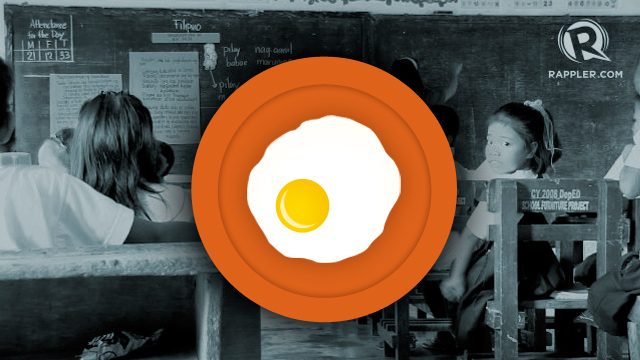SUMMARY
This is AI generated summarization, which may have errors. For context, always refer to the full article.

MANILA, Philippines – A house bill is urging the government to provide free breakfast to all students enrolled in public elementary schools, preschools, and day care centers.
House Bill 364 proposes an institutionalized free breakfast program, requiring government to allocate a specific budget.
Representative Raul Del Mar (1st District, Cebu City), author of HB 364, emphasized the need for such a law since many of the children attending public schools come from poor households and are more vulnerable to undernourishment and malnutrition. (WATCH: Peter Pan and never growing up)
Last March a Technical Working Group (TWG) was formed by the House Committee on Basic Education. It has inched forward after Del Mar filed the bill in July 2013.
In school year 2012-2013, more than half a million Filipino schoolchildren were severely wasted – too thin for their height – according to the Department of Education (DepEd). In fact, the United Nations Children’s Fund (Unicef) ranked the Philippines as the 10th country in the world with the most wasted children.
“These children coming to school with practically no breakfast from home cannot be expected to absorb their lessons in school while suffering hunger pangs,” Del Mar said in a press statement. (READ: Learning on an empty stomach)
These conditions not only affect children’s current academic performance, physical and mental well-being, but may also impact on their health and employment prospects as adults.
Looking at the bigger picture, the Philippines is not only risking the children’s future, but also the entire country’s. (READ: Socioeconomic cost of malnutrition)
Useful, yet pending
The TWG for HB 364 is composed of representatives from the Department of Health (DOH), the National Nutrition Council (NNC), the Department of Education (DepEd), and the Food and Nutrition Research Institute of the Department of Science and Tehcnology (FNRI-DOST); as well as authors of other pending bills related to feeding programs.
|
Pending house bills related to school feeding programs |
|
|
HB 624 |
Compulsory milk feeding program for public schoolchildren from kindergarten up to elementary |
|
HB 680 |
Nationwide school feeding program |
|
HB 1154 |
Nationwide school feeding program |
|
HB 1347 |
Institutionalized feeding program for public elementary and kindergarten students |
|
HB 1452 |
Mandatory nationwide nutrition programs for public elementary schools and barangay daycare centers |
|
HB 1504 |
Child Nutrition Act |
|
HB 1548 |
Mandatory nationwide nutrition program for public elementary schools and barangay health centers |
|
HB 2627 |
National Feeding Program for public students from kindergarten to high school |
The TWG decided to work on consolidating the provisions of the above bills. As of April, Del Mar announced that the TWG is already “crafting a proposed law” based on HB 364.
An earlier version of the bill was filed by Del Mar’s daughter, Representative Rachel Del Mar, in 2010. It reached the Senate and was filed by Senator Miriam Defensor Santiago in 2012. However, it has remained pending since then.
Existing programs

DepEd and the Department of Social Welfare and Development (DSWD) conduct feeding programs for selected schools across the country.
Both programs last for an average of 120 days. DepEd identifies malnourished students as beneficiaries, while DSWD targets almost all daycare centers nationwide. However, Del Mar wants the program to go beyond these.
“Unlike in the past where it was implemented only for a limited duration and in (selected) areas for public schools, now it will cover all public schools,” Del Mar said.
A possible problem, however, would be budget. Both departments noted earlier that financial constraints make it hard to reach more beneficiaries.
One of the UN Millennium Development Goals is to reduce hunger and poverty by at least half from 1990 to 2015. In the past 15 years, however, the degree of hunger among Filipino households rose from 11% to 19.5% (1998-2013), according to polling firm Social Weather Stations (SWS).
“There is therefore an urgent need to fine-tune these programs of the DepEd and enhance the same by providing the said free breakfast program in all public schools in the country,” Del Mar said in his statement.
The prevalence of underweight, stunting, and wasting among school-age children has remained virtually unchanged through the years. (READ: PH hunger in numbers)
Dropouts
The persistence of hunger among students may be a contributing factor to school dropouts. The Philippines is the 5th country in the world with the most school drop-outs, according to Unesco.
Many drop-outs and their parents blame either the lack of money, baon, or time – since some of them are already working.
The proposed program aims to help the prevention of malnutrition, as well as to keep more children in school.
The Philippine Plan of Action for Nutrition (PPAN) for 2011-2016 cites hunger as one of the country’s biggest challenges. It recommended increasing the country’s investments on intervention programs addressing children’s health and nutrition problems.
Del Mar said that PPAN’s plans must be integrated with the efforts of the national government, local government units (LGUs), nongovernmental organizations (NGOs), the business sector, and the international community.
Most important meal of the day
NNC advises parents to ensure that their children eat breakfast, since children who do perform better in school.
A 2013 study from the University of Leeds had the same findings, citing improved behavior among students. The University of Florida observed that children who skip breakfast tend to be more cranky, tired, and distracted. (READ: Hunger and child behavior)
Breakfast provides one-third of total energy requirements, and yet it is the most commonly skipped meal, NNC said. It is also essential for bodily functions like tissue growth and repair.
NNC encourages parents to prepare simple breakfasts such as rice or bread with eggs or any protein-rich food, cereals or oatmeal plus milk, and vitamin C-rich fruits like papaya.
Children are advised to keep regular sleeping and eating habits so as not to skip the most important meal of the day. FNRI-DOST explained that skipping breakfast contributes to nutrient inadequacies, such as calcium deficiency.
The World Health Organization said that skipping breakfast does not necessarily result in weight loss; in fact, it can make children eat more during lunch. This, in turn, could either lead to obesity or eating more junk. (READ: Hidden Hunger) – Rappler.com
What do you think of this bill? Do you have other policies in mind? Share your ideas with us. You can send articles and video materials to move.ph@rappler.com.
Add a comment
How does this make you feel?
There are no comments yet. Add your comment to start the conversation.